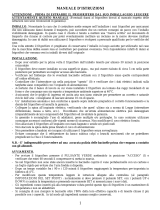17
Installation
* Qualified personnel are accredited experts who are
able, by virtue of their training and knowledge, to vouch
for the correct installation and implementation of the lea-
kage test.
4.8 Gas installation
The gas connection shall be carried out
by qualified personnel* only.
WARNING!
Observe the regulations stated in secti-
on 4.1 .
This refrigerator is provided for installati
on within liquid gas equipment in com-
pliance with EN1949 and must be run
exclusively on liquid gas (propane, buta-
ne) (no natural gas, town gas).
A fixed, pre-set pressure regulator com-
plying with EN 12864 must be connected
to the liquid gas cylinder.
The pressure regulator must concur with
the operating pressure specified on the
rating plate of the appliance. The opera-
ting pressure corresponds to the stan-
dard pressure of the country of specifi-
cation (EN 1949, EN 732).
Only one connection pressure is permis
sible for any one vehicle! A plate sho-
wing the permanent, clearly legible noti-
ce must be displayed in full view at the
point where the gas cylinder is installed.
The gas connection to the appliance
must be installed securely and free of
stress using pipe connectors and must
be securely connected to the vehicle (a
hose connection is not permissible) (EN
1949).
The gas connection to the appliance is
effected by means of (Ermeto-) olive
type fitting L8, DIN 2353-ST, complying
with EN 1949 ( s. figure 34).
After professional installation, a leakage
test as well as a flame test have to be
carried out by qualified personnel* in
conformity with EN 1949. A test certifica-
te has to be issued.
The refrigerator must be equipped with a
shut-off valve allowing to cut the supply
line. Such a shut-off device must be
readily accessible to the user.
Dometic refrigerators are equipped for a con-
nection pressure of 30 mbar. For connection
to a 50 mbar gas system, use Truma VDR
50/30 medium pressure controller.
Connection pressure and gas categories
The refrigerators are operated using the gases
and inlet pressures stated below. The pressu-
re reducing valves between the gas cylinder
and refrigerator to be used must comply with
the categories stated in the following table.
Category Pressure in mbar GAS
I3B / P(30) 30 Butane
30 Propane
I3+ (28-30/37) 28-30 Butane
37 Propane




















